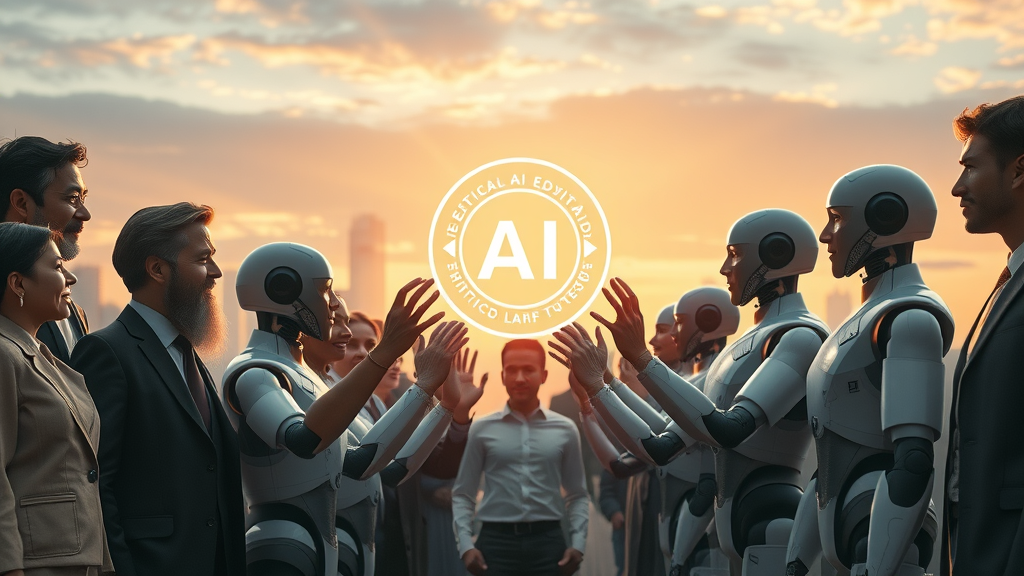Did you know that up to 85% of AI projects may deliver biased or unfair outcomes if ethical standards aren’t carefully applied? In a world rapidly embracing artificial intelligence, this statistic isn’t just a warning—it's a call to action for everyone working with or affected by AI. AI ethics and challenges now touch every aspect of our lives, from the news in our feeds to life-altering decisions in health care and justice. This comprehensive guide will equip you with insights and practical steps to understand, anticipate, and address the most pressing ethical issues in artificial intelligence today.
A Startling Look at AI Ethics and Challenges: Why It Matters Now
Artificial intelligence has moved from the realm of science fiction into the fabric of everyday life, creating immense potential but also introducing complex ethical challenges. AI ethics and challenges are rapidly emerging as central topics in technology, business operations, and public policy. As AI technology evolves, AI systems make decisions about hiring, policing, medical care, and even loan eligibility—areas that deeply affect human rights and societal well-being.
Ignoring ethical concerns in AI deployment can lead to devastating consequences, such as discrimination, loss of privacy, and the erosion of trust in institutions. Ethical issues hover over every smart device, autonomous vehicle, and intelligent assistant. If we don’t ensure that AI is implemented responsibly, we risk allowing machine learning models and AI algorithms to amplify systemic bias drawn from historical data or to turn into "black box" systems that lack transparency. Now more than ever, addressing the ethical challenges associated with artificial intelligence isn’t just prudent—it's absolutely necessary for a fair, just, and truly beneficial digital future.

What You'll Learn From This Guide to AI Ethics and Challenges
Understand what constitutes AI ethics and challenges in modern technology
Identify core human rights issues intertwined with artificial intelligence
Recognize common ethical concerns and how to address them
Gain insights into real-world examples and expert viewpoints
Learn actionable steps to navigate AI ethical challenges
Defining the Landscape: AI Ethics and Challenges Explored
How Artificial Intelligence is Shaping Ethical Challenges
The meteoric rise of artificial intelligence has prompted urgent discussions around ai ethics and challenges that transcend technological progress. As AI systems process data on a massive scale, they can surface patterns and insights faster than ever before—but with that speed comes ethical issues. For example, facial recognition technology may improve security yet lead to invasive surveillance, limiting personal freedoms and privacy. Moreover, machine learning models trained on biased or incomplete historical data risk perpetuating inequality or discrimination, making fair and responsible ai development a complex task.
AI technologies reshape decision-making in domains like health care, finance, and law enforcement. As AI systems make choices once left to humans, ethical challenges emerge: Who will be accountable if an autonomous vehicle makes a fatal mistake? How do we ensure ai algorithms take into account the nuanced realities of human rights and cultural differences? These questions are now central to building public trust and fostering an environment where innovative artificial intelligence can thrive without compromising well-being or social justice.
Why Human Rights Are Core to AI Ethics and Challenges
Human rights are the foundation upon which ai ethics and challenges must be assessed. From the right to privacy to the right to equal treatment, the deployment of ai must honor fundamental protections guaranteed in democratic societies. Unchecked AI systems could not only infringe upon these rights but also widen socioeconomic gaps or marginalize vulnerable communities further. As AI technology becomes a decision-maker, its values—coded by humans—can either reinforce or undermine our shared ethical standards.
Ethical ai development depends on transparent, accountable practices that respect individual freedoms. When AI systems process data or power services like intelligent health care delivery, algorithms must be scrutinized for discriminatory outcomes. True responsible ai is about more than compliance—it’s about a proactive commitment to safeguarding dignity and justice. Recognizing human rights at the heart of ai ethics and challenges is non-negotiable if AI is to enhance, rather than erode, the social contract that underpins civil society.
AI Ethics: Major Ethical Challenges of Artificial Intelligence
Ethical Concerns: Bias, Transparency, and Accountability
Among the most critical ethical concerns in artificial intelligence are bias, transparency, and accountability. AI systems frequently learn from historical data riddled with social and cultural prejudices. Without intervention, these systems may make unfair or discriminatory decisions—imagine an ai system used by a care provider making biased health care recommendations, or an AI-driven recruitment system favoring certain demographics over others. Such scenarios highlight how ethical challenges aren't just technical puzzles; they have tangible effects on real lives.
Transparency is another pivotal aspect of ai ethics and challenges. As AI models become more complex, they often turn into black box systems whose decision-making processes are difficult even for experts to explain. This opacity makes it hard for individuals to challenge unjust outcomes or for organizations to ensure ai accountability. Establishing ethics principles and requiring documentation throughout the AI development process can help, but organizations must remain vigilant, continually updating practices as technology evolves to ensure that ai systems remain responsible, understandable, and legally compliant.

Case Studies: Notorious Ethical Challenges in AI
Real-world examples highlight the darkest edges of AI’s potential. Consider the deployment of facial recognition technology by law enforcement agencies; while it promises enhanced safety, reports have shown misidentification rates are disproportionately high among minorities, raising serious human rights concerns. Another notorious instance involves AI algorithms used in judicial systems where the systems make bail or parole recommendations. These AI systems have been criticized for amplifying social inequality due to bias in their training data, demonstrating the vital need for ethical oversight.
In health care, AI-driven diagnostics offer incredible promise but present ethical challenges, especially when "black box" algorithms make recommendations that cannot easily be explained to patients or providers. Similarly, autonomous vehicles may one day drastically reduce accidents, but they also face unresolved ethical issues: How should the system prioritize safety in a no-win scenario? By learning from these notorious case studies, organizations can anticipate pitfalls and build responsible ai systems that earn trust and deliver on their promise for good.
"We must ensure that artificial intelligence respects human dignity and rights, irrespective of the technology's sophistication."
The 5 Ethics of AI: Core Principles and Practical Examples
Fairness
Accountability
Transparency
Privacy
Beneficence
Principle |
Real-World Example |
|---|---|
Fairness |
Adjusting hiring algorithms to remove gender or racial bias in recruitment. |
Accountability |
Establishing clear policies for who is responsible when AI systems make critical decisions, such as in autonomous vehicles. |
Transparency |
Mandating explanation tools for healthcare AI diagnostics to allow doctors and patients to understand recommendations. |
Privacy |
Protecting personal data in smart home devices by using on-device processing rather than cloud-based storage. |
Beneficence |
Deploying AI for social good projects, like using AI technology to efficiently distribute disaster relief supplies. |

The 7 Principles of Ethical AI: Expanding the Framework
Transparency
Justice and Fairness
Non-maleficence
Responsibility
Privacy
Beneficence
Freedom and Autonomy
Exploring the Four Main Ethical Considerations of AI
Ethical Challenges from Different Perspectives
Ethical challenges in artificial intelligence are best understood through multiple lenses: individual, societal, organizational, and regulatory. From the individual's perspective, one core ethical concern is respect for human rights, such as maintaining user privacy or freedom from discrimination. On a societal level, AI ethics encompasses ensuring collective well-being, addressing potential job disruption by AI technologies, and managing how systems make decisions that affect communities en masse.
Organizational and regulatory perspectives focus on accountability and responsibility for AI development and deployment. As AI systems become more autonomous, which party should be held responsible for negative outcomes—the developer, the deployer, or the regulator? Regulatory guidance can help ensure AI aligns with public welfare by encouraging transparency, explainability, and mechanisms for recourse. When combined, these perspectives produce a robust ethical framework that can evolve with future of ai advancements and societal expectations.
Respect for Human Rights
Accountability and Responsibility
Transparency and Explainability
Safety and Security

Human Rights at the Intersection of AI Ethics and Challenges
Navigating Privacy Concerns with Artificial Intelligence
AI ethics and challenges become particularly acute when examining privacy. Personal data has become the fuel that powers modern AI algorithms and machine learning systems, but it also exposes individuals to unprecedented surveillance and profiling risks. The way ai systems process data—be it in health care, finance, or urban planning—influences how private information is collected, stored, and shared. As smart devices proliferate and digital footprints widen, protecting privacy grows increasingly complex and vital.
Laws like the GDPR have attempted to ensure AI respects privacy by requiring informed consent and granting individuals rights over their own data. Still, many AI technologies operate in legal gray areas, leading to ongoing debates about scope and enforcement. If AI development prioritizes transparency, data minimization, and robust security practices, these privacy concerns become more manageable. Ultimately, the right to privacy must remain a guiding light in any discussion of AI ethics and challenges, ensuring that progress does not undermine personal autonomy.
Discrimination and Social Harm as Major Ethical Issues
Beyond privacy, one of the gravest ai ethics and challenges is the risk of discrimination and social harm. AI systems can inadvertently perpetuate stereotypes or reinforce existing inequalities when built upon incomplete, unbalanced, or historically biased datasets. This danger manifests not just in policing or credit scoring, but even in areas like health care, where disparate treatment can lead to unequal medical outcomes.
Proactive steps are essential to mitigate these risks: Diverse data collection, bias-testing, and the inclusion of marginalized voices in AI development help ensure AI systems make fairer, more informed decisions. Regular audits and clear accountability frameworks also play an essential role. Otherwise, the deployment of ai will threaten social cohesion and human rights, rather than enhancing them. Ethical AI isn’t just a technical requirement—it’s a societal obligation to prevent systemic harm.

The Future of AI Ethics and Challenges: Trends, Risks, and Opportunities
Anticipating Future Ethical Concerns in Artificial Intelligence
The future of ai ethics and challenges promises to be both exciting and fraught with new dilemmas. As AI systems become more autonomous and embedded in daily life, issues like algorithmic transparency, data ownership, and the social impact of widespread automation are set to intensify. AI technologies will increasingly intersect with societal values: the ethics of emotion recognition, the fairness of AI-powered credit assessments, and the security implications of AI-driven infrastructure all require ongoing scrutiny.
Policymakers, developers, and civil society must collaborate to forecast and address these emerging risks. Establishing dynamic, flexible guidelines can ensure AI ethics remain relevant amid rapid technological change. It is also vital to foster cross-disciplinary research that merges technical expertise with philosophy, sociology, and law, ensuring that responsible ai isn’t an afterthought but a foundational principle in all AI development.

Building a Robust Framework for AI Ethics and Human Rights
To guarantee a future where AI works for everyone, building robust ethical frameworks must be a collaborative and adaptive process. Industry bodies, governmental agencies, and non-profit organizations have started outlining international standards for AI, like the OECD’s AI Principles and UNESCO's guidelines. These frameworks identify key priorities such as explainability, public transparency, and effective recourse mechanisms for those harmed by AI decisions.
Public education also remains crucial. By raising awareness of AI’s potential harms and benefits, we empower citizens to demand responsible practices from developers and policymakers. Internal organizational changes—such as the creation of AI ethics boards and mandatory ethics training—reinforce ethical priorities from the top down. The success of responsible ai ultimately hinges on collective vigilance and the continuous reaffirmation of human rights at the heart of all AI endeavors.
"Ethical AI isn't just a technical issue—it’s a social contract between innovators, policymakers, and humanity."
People Also Ask
What are the challenges and ethical concerns of AI?
The main challenges and ethical concerns of ai include bias in decision-making, lack of transparency in black box systems, privacy risks, discrimination, and accountability for AI-driven outcomes. AI systems can process vast historical data, sometimes amplifying unfairness or human rights violations. Ensuring ai systems are developed responsibly helps minimize these ethical issues and ensures societal trust and positive long-term outcomes.
What are the 5 ethics of AI?
The five core ethics of AI are: fairness, accountability, transparency, privacy, and beneficence. Fairness ensures AI systems do not perpetuate bias; accountability assigns responsibility for outcomes; transparency builds user trust through openness; privacy safeguards personal data; and beneficence ensures AI acts in the public good. These principles guide ethical ai development and deployment.
What are the 7 principles of ethical AI?
Ethical AI is guided by seven principles: transparency, justice and fairness, non-maleficence (avoiding harm), responsibility, privacy, beneficence, and freedom and autonomy. These principles help organizations design, evaluate, and regulate ai technologies that impact individuals and society, supporting human rights at every stage of ai development.
What are two of the four ethical considerations of AI?
Two major ethical considerations in AI are respect for human rights and accountability. Respect for human rights ensures AI doesn’t violate freedoms or discriminate, while accountability ensures clarity about who is responsible for system decisions. Both are vital to building responsible ai that earns public trust and upholds ethical standards.
Expert Opinions: Navigating AI Ethics and Challenges
"Without strong ethical foundations, artificial intelligence threatens to undermine the very human rights it should protect."

Key Takeaways: Making Sense of AI Ethics and Challenges
AI ethics and challenges are evolving rapidly as technology develops.
Human rights must remain at the core of any AI deployment.
Continuous oversight and updated regulations are essential to manage emerging ethical concerns.
Public awareness and ongoing education are vital to shaping a positive future for artificial intelligence.
FAQs: Your AI Ethics and Challenges Questions Answered
How can individuals contribute to responsible AI?
Individuals can advocate for transparency, participate in AI policy discussions, and educate themselves about ethical AI practices. By being informed, they can make better choices about using AI products and support organizations that prioritize ethical development.What role does government play in AI regulation?
Governments establish legal frameworks and standards for AI deployment, ensuring AI aligns with public values and human rights. Through regulation and oversight, they hold developers and organizations accountable and provide recourse when ethical concerns arise.Are there international standards for AI ethics?
Yes, several organizations, such as the OECD and UNESCO, have established international guidelines for AI ethics. These frameworks promote shared principles like transparency and justice while supporting coordinated global efforts to address ethical challenges.How can businesses implement ethical AI practices?
Businesses should integrate ethics reviews into their AI development lifecycle, foster diverse design teams, conduct regular audits for bias, and remain transparent about how AI systems make decisions—all while prioritizing privacy and fairness for users and stakeholders.
Conclusion: Securing an Ethical Future for Artificial Intelligence

By centering ethics and human rights in every AI initiative, we can unlock technology’s power for good while protecting what makes us human.
Your Next Step: Master Your AI-Powered Digital Marketing Strategy with Our Ultimate Guide
Mired in the Muck of Stale, Unproductive Marketing? The Marketing Landscape Rapidly Changing and You don’t Seem to be Able to Keep Pace? Don’t want to be Late to the Marketing Party? Click the Link and Get “The Ultimate Guide to AI-Powered Digital Marketing Strategies"
Sources:
To deepen your understanding of AI ethics and challenges, consider exploring the following authoritative resources:
“The Ethical Challenges of AI and Their Actionable Solutions” by GLOBIS Insights offers a comprehensive analysis of key ethical issues in AI, including data security, privacy concerns, and the risks of data manipulation. The article provides practical solutions to mitigate these challenges, such as implementing transparent data usage policies and robust cybersecurity measures. (globisinsights.com)
“AI Ethics: Challenges, Importance, and Future” from GeeksforGeeks delves into the ethical challenges posed by AI, such as algorithmic biases, lack of transparency, and accountability issues. It emphasizes the importance of establishing clear ethical principles and accountability structures to ensure responsible AI development. (geeksforgeeks.org)
These resources provide valuable insights into the complexities of AI ethics and offer practical steps to navigate the associated challenges.
 Add Row
Add Row  Add
Add 




Write A Comment